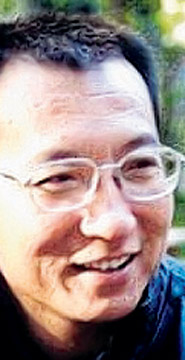 On the eve of International Human Rights Day, the Chinese government has arrested prominent dissident writer Liu Xiaobo.
On the eve of International Human Rights Day, the Chinese government has arrested prominent dissident writer Liu Xiaobo.
Jane Macartney reports for the Times in Beijing:
A leading dissident who organised a charter signed by hundreds of Chinese thinkers, academics and writers calling for dramatic political and legal reforms was under arrest yesterday.
Liu Xiaobo, a literary critic first jailed for his role in the 1989 Tiananmen Square demonstrations, was taken from his home in Beijing late on Monday by a dozen police officers and was asked to sign a document acknowledging his detention. They searched his flat and took away three computers, mobile phones and documents, friends told The Times.
His arrest came hours before the release on the internet of the “Charter 08”, a rare, outspoken document challenging the ruling Communist Party to grant greater freedom of expression and to hold free elections. Its publication was timed to coincide with the 60th anniversary of the Universal Declaration of Human Rights today.
AFP reports that his wife told journalists that he was detained on Monday and is being held by Beijing Public Security:
She said she was not told why her husband had been detained, but suspected it was related to Charter 08, which calls for democratic reform in China and has been signed by more than 300 Chinese people, including Liu Xiaobo.
The charter has been published online and its signatories include intellectuals and human rights activists, according to press freedom advocates Reporters Without Borders.
Liu’s wife said police had searched their house all night and seized their computer and mobile phones.
Read the full text of Charter 08 (in Chinese) here.
Update: Perry Link has translated the full text of Charter 08 into English and it is available on the New York Review of Books website and on the China Rights Defender website:
A hundred years have passed since the writing of China’s first constitution. 2008 also marks the sixtieth anniversary of the promulgation of the Universal Declaration of Human Rights, the thirtieth anniversary of the appearance of Democracy Wall in Beijing, and the tenth of China’s signing of the International Covenant on Civil and Political Rights. We are approaching the twentieth anniversary of the 1989 Tiananmen massacre of pro-democracy student protesters. The Chinese people, who have endured human rights disasters and uncountable struggles across these same years, now include many who see clearly that freedom, equality, and human rights are universal values of humankind and that democracy and constitutional government are the fundamental framework for protecting these values.
By departing from these values, the Chinese government’s approach to “modernization” has proven disastrous. It has stripped people of their rights, destroyed their dignity, and corrupted normal human intercourse. So we ask: Where is China headed in the twenty-first century? Will it continue with “modernization” under authoritarian rule, or will it embrace universal human values, join the mainstream of civilized nations, and build a democratic system? There can be no avoiding these questions.
See also an article from the Telegraph comparing the Charter 08 to Charter 77, and reporting that several signatories have been detained:
“After we handed over the Charter, I was detained by the police,” said Zhang Zuhua, a writer and political analyst. “Right now the police have searched my home. My computer and documents have all been taken away.
“I am now being held at my home. I can’t go anywhere. I don’t know what will happen to me next. But I was told by the police that they are carrying out a formal investigation, so I think there will soon be further punishment.”
Other signatories have been detained in Zhejiang province in central China, and Guizhou in the south.
Here is Austin Ramzy’s report on the Time Magazine: A New Call for Chinese Democracy
How the government reacts to the document — and the people who signed it — remains to be seen. Pu Zhiqiang, a prominent rights attorney in Beijing, says he signed the charter because he supports its emphasis on freedom and democracy. “Not only do I approve these ideas, I believe the Chinese Communist Party and the Chinese government have no reason not to approve them,” Pu says. “These are not bad ideologies; the charter does not advocate violence, nor does it aim to destroy the current social order.”
More than 500 people joined Pu in signing the document. Bao Tong, a deputy to Communist Party secretary Zhao Ziyang who was purged from the government for his support of the 1989 pro-democracy protesters, is the most prominent former official on the list. It also includes activists such as Liu Xiaobo and Ding Zilin, who co-founded the Tiananmen Mothers group after her teenage son was killed in the 1989 crackdown. Several prominent lawyers and writers who are actively working and publishing also signed, giving “Charter 08” more clout than it would carry if it was only the work of politically isolated dissidents. “It seems like a varied bunch and I think the Internet helped bring these people together,” says Joshua Rosenzweig, a Hong Kong-based official with the Dui Hua Foundation, a human rights group. “It’s not simply what many people call ‘dissidents.’ There are a number of well-known liberal intellectuals and lawyers.”
The declaration was released during a period of sensitive anniversaries. It comes 60 years after the signing of the Universal Declaration of Human Rights, which Chinese scholar P.C. Chang helped draft, and 30 years after Deng Xiaoping launched the economic liberalization that would transform China into a capitalist powerhouse. It was also 30 years ago that activists in Beijing posted signs on a “Democracy Wall” calling for political reform, including electrician Wei Jingsheng’s declaration that Deng Xiaoping’s campaign for “Four Modernizations” in agriculture, defense, industry and technology was meaningless without a fifth modernization, democracy.







